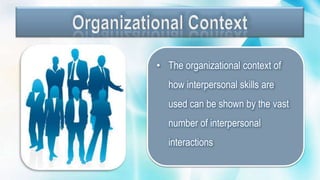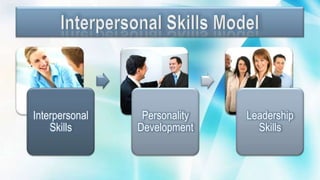Interpersonal skills
- 2. • Interpersonal Skills • Organizational Context • Why Interpersonal Skills • Interpersonal Skills Model • 10 Tips to Develop Interpersonal Skills
- 4. • All about working with other people • An ability to get along with others while performing the job • Characteristic traits like Manners, attitude, courtesy, habits, behavior and appearance which helps us to communicate and maintain relationship with others
- 5. • The organizational context of how interpersonal skills are used can be shown by the vast number of interpersonal interactions
- 6. • Take the relationship viewpoint: – Effective relationships within the organization – Effective relationships with suppliers – Effective relationships with competitors
- 7. • Internally – In Teams – Across Teams – Within and between departments and business units
- 8. • Externally – With Suppliers – With Customers
- 9. • To gain real competitive advantage through such relationships in the long term is dependent upon your level of interpersonal skills
- 10. • To Improve: Relationship Productivity Working Environment All Round Success Leadership Skills Liking by Others
- 13. • While working in groups to form effective teams • Socializing at work place • Presenting your self at work • Listening & Questioning • Giving or receiving feedback • Building & maintaining relationships
- 14. • Smile
- 15. • Be Appreciate
- 16. • Pay Attention
- 17. • Practice Active Listening
- 18. • Bring People Together
- 21. • Humor Them
- 22. • Empathy/See It On Their Side
- 23. • Don’t Complain (Too much)
- 24. • Interpersonal Skills • Organizational Context • Why Interpersonal Skills • Interpersonal Skills Model • 10 Tips to Develop Interpersonal Skills
























